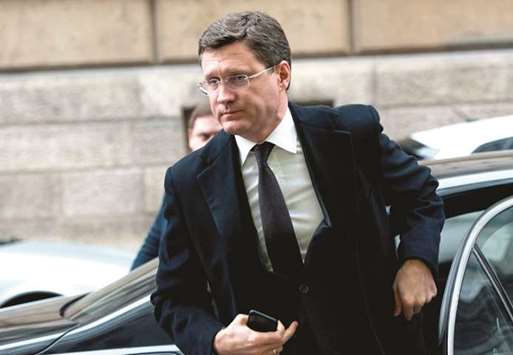Russia’s qualms over how far to prolong oil-output cuts with Opec may reflect a shifting calculus for an economy feeling increasingly hobbled by shackling one of its biggest growth drivers.
Although a recovery in crude prices was crucial to mending the budget and the rouble, Russia is now confident it can ride out a downturn in oil if it comes to that. On Wednesday, Opec and Russia moved closer to a deal to extend their oil production cuts until the end of next year, but there was no indication that Moscow had received the assurances it was said to be seeking on how and when the agreement could be phased out.
With growth in industrial output at a halt after a surprise deceleration in gross domestic product last quarter, Russia was getting second thoughts over the historic agreement struck a year ago with the Organization of Petroleum Exporting Countries and due to expire at the end of March. Meanwhile, Rosneft may be eager to shake off the pact’s restraints toward the end of 2018, given the pipeline of projects Russia’s biggest oil company has in the works, according to Citigroup Inc
“A flat oil production profile is quite a big hit to GDP,” Clemens Grafe, an economist in Moscow at Goldman Sachs Group Inc, said by phone. “Russia has to be very careful not to overextend and basically support oil prices in the short run at the expense of lower oil prices in the long run, hence adding to volatility rather than reducing it.”
Russia’s recovery stumbled last quarter following the country’s longest recession this century, with Economy Minister Maxim Oreshkin partly blaming the curbs negotiated with Opec for the zero growth in industrial output in October. Crude production has decreased by 2.7% since reaching its post- Soviet record in October 2016.
The world’s biggest energy exporter has already made clear it’s hunkering down for years of depressed oil prices, using the level of $40 a barrel for Russia’s Urals blend to shape its entire economic policy, from its monetary stance to public finances. It’s the price used to calculate the country’s budget in 2017-2019 and to carry out foreign-exchange purchases as part of a fiscal mechanism implemented this year.
Russia’s gains from the deal with Opec were estimated at 2.5tn roubles ($43bn), with some 1.75tn of additional tax revenue and the rest going as an extra gain to oil companies, according to President Vladimir Putin. To balance the budget, the government needs the price of oil to average $60 a barrel this year and $50 in 2018, about half the level in 2012-2013. The oil industry accounts for 15-20% of GDP, according to Goldman Sachs.
For Russia, reassurance about how the cuts would eventually be wound down seemed to be as important as the duration of the extension, according to people involved in the closed-door negotiations in Vienna. Russian Energy Minister Alexander Novak offered a positive impression of the discussions so far, and said final details would be announced yesterday.
Russian oil producers currently aren’t hurting from the curbs, but the situation will change next year as Rosneft looks to bring greenfield projects on stream and tries to reverse a natural decline at its existing fields, according to Ronald Smith, Citigroup’s energy analyst in Moscow.
Another concern for Russia is the possible fallout of higher oil prices for the currency. Coming off its best-ever year in 2016, the rouble is up another 5% in 2017 against the dollar, threatening the competitiveness of Russian exporters.
Still, the rouble has increasingly decoupled from oil, with the link eroded this year as foreign investors piled into Russian assets to benefit from one of the highest real yields in emerging markets. The rouble has also been shielded by the Finance Ministry’s foreign-currency purchases to soak up revenue earned in excess of the $40 oil price assumed in the budget.

Russian Energy Minister Alexander Novak arrives for the informal meeting of the Organization of the Petroleum Exporting Countries on the eve of the 173rd Opec Conference in Vienna on Wednesday. The world’s biggest energy exporter has already made clear it’s hunkering down for years of depressed oil prices.
